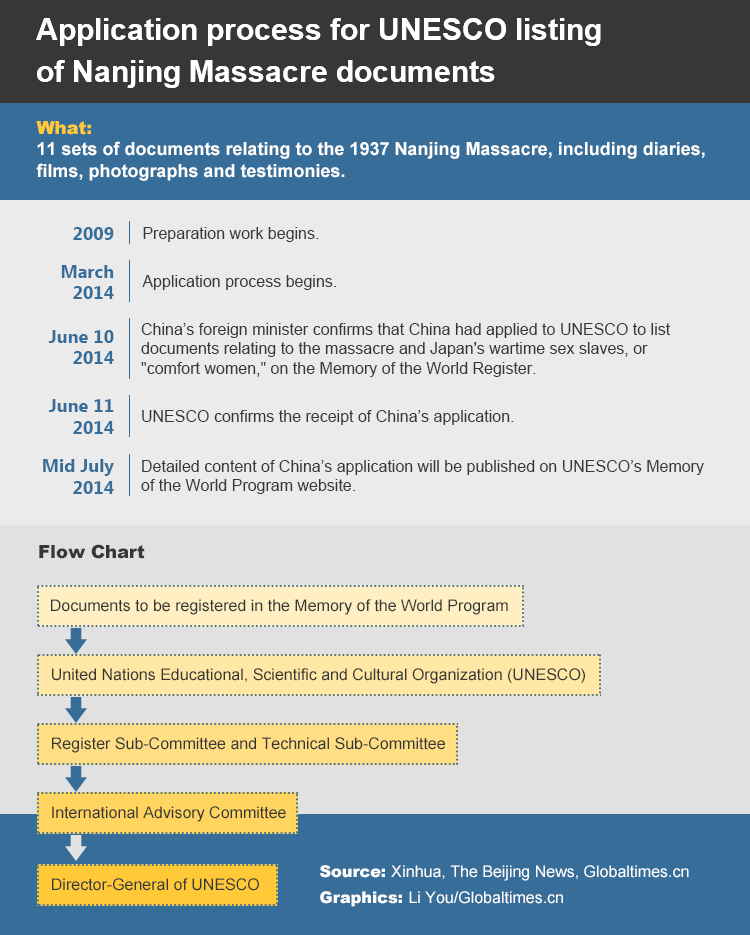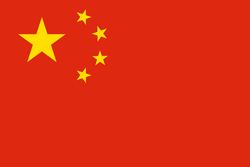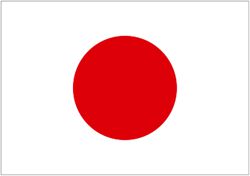UNESCO receives Chinese bid for listing of Nanjing documents
| Latest News |
China applies for UNESCO listing of Nanjing documents
China is applying to UNESCO to list 11 sets of documents relating to the 1937 Nanjing Massacre on the Memory of the World Register.
The documents are first-hand materials that recorded the massacre, and are of historical importance, said Zhu Chengshan, curator of the memorial hall of the victims, on June 11.
China rejects ‘unreasonable’ Japan protest to UNESCO
| Process |

| Comments |
Xinhua: Abe's administration should pay more respect to history
Abe and his administration reiterated that they will bolster Japan's strength and make Japan a "normal country," but if the leaders of the country cannot squarely face up to the country's history, Japan's image as a nation in the international community will only become increasingly abnormal.
Global Times: UNESCO listing helps to remind Japan of brutal history
The right wing's attempt to protest against authentic materials that can prove Japan's wrongdoings in the past only demonstrates their cowardice in the face of historical facts. China won't compromise on this matter as the atrocities perpetrated by Japanese troops are unarguable. They are globally confirmed facts. It would be a self-degradation if these Japanese rightists keep lying to themselves and the world.
| Response |
 | China on June 11 rejected Japan's call for it to withdraw an application to register records of Japan's wartime sex slaves with UNESCO. "We will not accept Japan's unreasonable protest, and will not drop our application," said Foreign Ministry spokeswoman Hua Chunying at a daily news briefing. Hua said, "The aim of China's application is to firmly bear history in mind and cherish peace, respect human dignity and prevent behaviors against humanity, human rights and human beings from happening again." |
 | Japanese Chief Cabinet Secretary Yoshihide Suga said his government "will lodge a protest and ask China to withdraw the application if there is a political intention behind it." |
| Memory of the World Program |
UNESCO established the Memory of the World Program in 1992. Impetus came originally from a growing awareness of the parlous state of preservation of, and access to, documentary heritage in various parts of the world. War and social upheaval, as well as severe lack of resources, have worsened problems which have existed for centuries. Significant collections worldwide have suffered a variety of fates. Looting and dispersal, illegal trading, destruction, inadequate housing and funding have all played a part. Much as vanished forever; much is endangered. Happily, missing documentary heritage is sometimes rediscovered.
China already has nine documents registered in UNESCO’s Memory of the World Program. They are: Ancient Naxi Dongba Literature Manuscripts, Ben Cao Gang Mu (Compendium of Materia Medica), Golden Lists of the Qing Dynasty Imperial Examination, Huang Di Nei Jing (Yellow Emperor’s Inner Canon), Official Records of Tibet from the Yuan Dynasty China (1304-1367), Qiaopi and Yinxin Correspondence and Remittance Documents from Overseas Chinese, Qing Dynasty Yangshi Lei Archives, Records of the Qing's Grand Secretariat - 'Infiltration of Western Culture in China', and Traditional Music Sound Archives.
Source: unesco.org
For detailed information, please click: Memory of the World – China
Web editor: guwei@globaltimes.com.cn

